His 27 goals and 52 points that season for the Stingers got the attention of the general mangers in the NHL, and Gartner was drafted 4th overall by the Washington Captials in the summer of 1979 following the demise of the Stingers and the WHA.
As an NHL rookie with the Capitals, Gartner scored 36 goals, beginning a streak of 30 goals or more seasons that would eventually reach into the mid 90's.
In ten seasons with the Capitals, Gartner would average 39.7 goals per season and never less than 35 until the 1988-89 season when he was traded to the Minnesota North Stars 56 games into the season while currently at 26 goals. He would, however, score an additional seven goals in Minnesota to keep his streak going at ten seasons.
After enjoying so much stability in Washington, Gartner's time in Minnesota would be brief, as he was dealt to the New York Rangers after 67 games in 1989-90, but not before scoring 34 goals with the North Stars. After joining the Rangers, he would add 11 more to his season total which allowed him to reach the 40 goal mark for the sixth time.
Three consecutive 40 goal seasons in Manhattan followed, which included Gartner scoring his 500th NHL goal during the 1991-92 season. He would later surpass the 600 goal barrier as well as 1,000 points, prior to once more being on the move, this time to his hometown Toronto Maple Leafs. Gartner's 28 goals in 71 games in New York and the six he scored in 10 games with the Maple Leafs pushed his 30 goal streak to an NHL record 15th consecutive season.
The strike shortened season of 1994-95 only allowed Gartner to play in 38 games, limiting him to just 12 goals and unfairly ending his streak of consecutive 30 goal seasons at 15, a league record which still stands today which would not be tied until 2007 by Jaromir Jagr.
Back to a full season schedule in 1995-96, Gartner would run his 30 goal season total up to 16 with 35 goals. The Maple Leafs would trade Gartner to the Phoenix Coyotes in time for their first season in the desert, having just relocated from Winnipeg. There, Gartner would achieve his 17th season of 30 goals or more in his career, also a league record and one which has never been equalled, when he scored at 9:46 of the second period on this date in 1997. His second goal of the night at 1:56 of the third period in a 5-0 Phoenix win over the Tampa Bay Lightning saw Gartner reach a milestone with the 1,300th point in his NHL career.
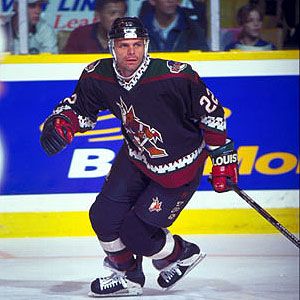
Gartner would play one final season in the NHL with Phoenix, scoring 12 goals in 60 games, which included his 700th career goal, making him only the fifth player to ever reach that milestone along with legends Wayne Gretzky, Gordie Howe, Marcel Dionne and Phil Esposito.
For the curious, Gretzky finished his career with 15 seasons of 30 goals or more which included a streak of 13 consecutive, which was ended with an injury shortened 1992-93 season of 45 games and just 16 goals. Gretzky did return to the lineup in time for the playoffs and led the Kings to the Stanley Cup Finals, adding another 15 goals in 24 games, giving him 31 combined for the season. Even if allowed to call 1992-93 a "30 goal season", he would still only equal Gartner's 15 consecutive seasons of 30 goals and ultimately fall short of Gartner's with 16 total.
Gartner's final career totals are 708 goals, still good for seventh all time, and 627 assists for 1,335 points.
While Gartner set records for his consistent goal scoring, he was probably better known for his speed, winning the always popular and high profile "Fastest Skater Competition" at the NHL All-Star Game each of the three times he entered, including 1993 when he scored four goals and was named the MVP of the All-Star Game.
During his career he would play in seven NHL All-Star Games and following his career he was inducted into the Hockey Hall of Fame in 2001 and his #11 was retired by the Capitals in 2008.
Today's featured jersey is a 1996-97 Phoenix Coyotes Mike Gartner jersey from the season during which he scored 30 or more goals for a record 17th time.
Phoenix arrived on the scene in 1996-97, having relocated from Winnipeg, and introduced the most unconventional jersey striping in the league, based on Native American blanket patterns from the American Southwest. Phoenix would wear the same home white and road black jerseys for seven consecutive seasons before a complete redesign in 2003-07 to coincide with a move to their new arena, brining to a close one of the most "Love it or Hate it" chapters in NHL jersey history.
Bonus jersey: Today's bonus jersey is a 1985-86 Washington Capitals Miek Gartner jersey from the club Gartner spent the majority of his NHL career.
This jersey features the five stars down the sleeves, which the Capitals jerseys had from 1974-75 until 1982-83 until going to just four stars for two seasons until reverting back to five again for the 1985-86 season.
Here is a great career retrospective of Mike Gartner's career on the occasion of his induction into the Hockey Hall of Fame, followed by his speech. The audio is a tad bit distorted, but still listenable.


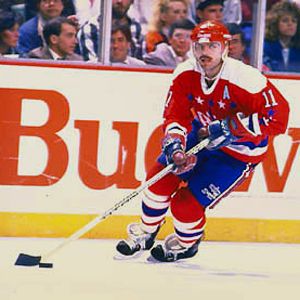
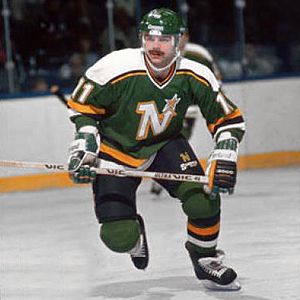
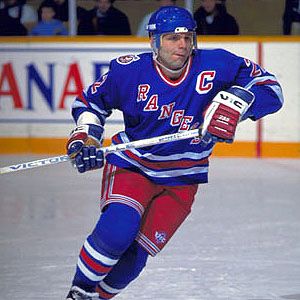



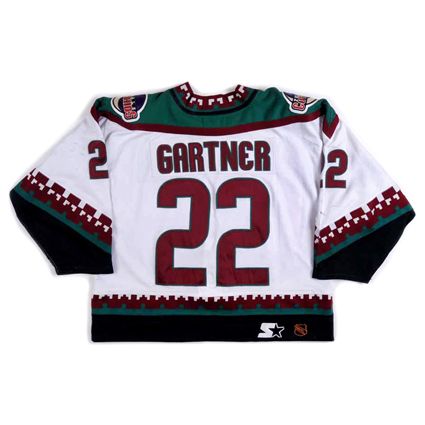
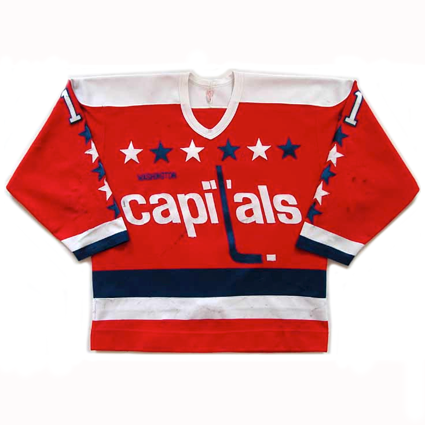
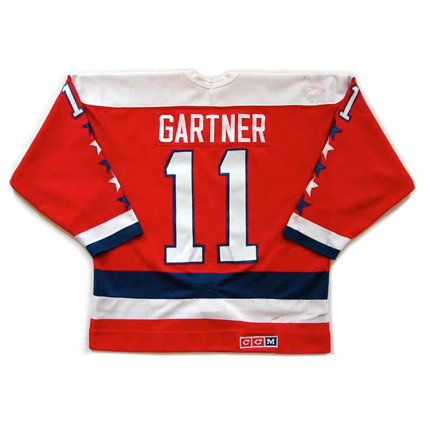










The Stingers and the Coyotes -- that's bridging some defunct-to-expansion hockey history! Great scorer.
ReplyDeleteWhy did the Capitals have only two stars on their sleeves in the mid-1980's?
ReplyDelete